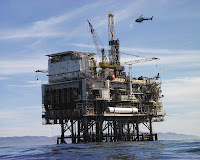Obama justified the move in terms of energy independence:
"This is not a decision that I've made lightly," Obama said at Maryland's Andrews Air Force Base, near the capital. He was staged beside the "Green Hornet," a Navy fighter jet designed to run on a fuel mix of half biomass. He also discussed administration policies to make automobiles more fuel efficient and to develop "clean coal" and alternative energy supplies.
Obama said his plan "is part of a broader strategy that will move us from an economy that runs on fossil fuels and foreign oil to one that relies more on homegrown fuels and clean energy. And the only way this transition will succeed is if it strengthens our economy in the short term and long term. To fail to recognize this reality would be a mistake."
I would feel better about this development if it were announced as part of a compromise that would bring significant action on climate change. Since this is being done well in advance of voting on any climate bill in the Senate, it is not clear how much of a political difference it will make. Sen. Lindsey Graham had some positive things to say about the move, but he did not make any public commitments regarding a climate bill. Most of his Republican colleagues were still not satisfied. The move may be calculated to please moderate and conservative Democrats, though again there were no public commitments from them regarding a climate bill. As with the health care bill, Democrats have prematurely conceded one of their potential bargaining chips.
Ken Salazar spoke yesterday morning as if cap and trade is dead.
"I think the term 'cap and trade' is not in the lexicon anymore," Salazar said, adding that supporters -- including senators working on legislation -- will focus more on ideas such as slowing pollution, creating jobs and becoming energy independent. "It's in that context" the Senate will move forward, he said.A spokeswoman later clarified that he was only referring to the phrase "cap and trade," but that still leaves how the administration plans to slow and reverse carbon emissions as an open question.
Even if oil companies take advantage of the new drilling opportunities, it is unclear how much they will be able to produce. The most optimistic estimate has 4 billion barrels of oil and 30 trillion cubic feet of natural gas in the newly opened areas, which represents a fraction of US energy needs. Even then, it would take decades to study potential deposits and implement drilling plans. The USGS will study coastal areas first, to identify tracts that might be amenable to energy development. Oil companies will then be able to bid for development leases. The eastern Gulf of Mexico is the area that seems most promising.
Offshore oil development carries substantial environmental risks. A worst-case scenario would be an event like the Santa Barbara oil spill of 1969, when 80,000-100,000 gallons of crude oil leaked from an oil rig into the channel and onto California beaches. That is an extreme case, but offshore rigs are constantly at risk, particularly in hurricane-prone areas like the Gulf of Mexico or southern Atlantic coast. Last fall, an oil rig off the northwest coast of Australia leaked oil for months and eventually caught fire.
According to the Center for Biological Diversity, new offshore oil exploration would threaten wildlife.
Oil development in the Beaufort and Chukchi seas, home to all of America’s polar bears, is strongly opposed by conservation groups as no technologies exist to clean up oil spills in icy waters. Oil development in the Beaufort Sea would likely also be visible from the shores of the Arctic National Wildlife Refuge. Today’s plan would allow existing leases in the Chukchi and Beaufort seas to move forward while the remainder of these areas would be subject to additional leasing following further environmental studies.So far I have not seen any support for this move among environmentalists; in fact, criticism has been fairly strong, with petitions against the move circulating from several organizations. (For example, here is one from Oceana.) I hope that this will solidify support for a climate bill from moderate senators, but I have my doubts.
The only bright spot in today’s announcement was that a lease sale proposed in Alaska’s Bristol Bay, within critical habitat for the North Pacific right whale, the world’s most endangered whale, would be cancelled. However, important habitat for the similarly endangered North Atlantic right whale would be opened in its stead.





